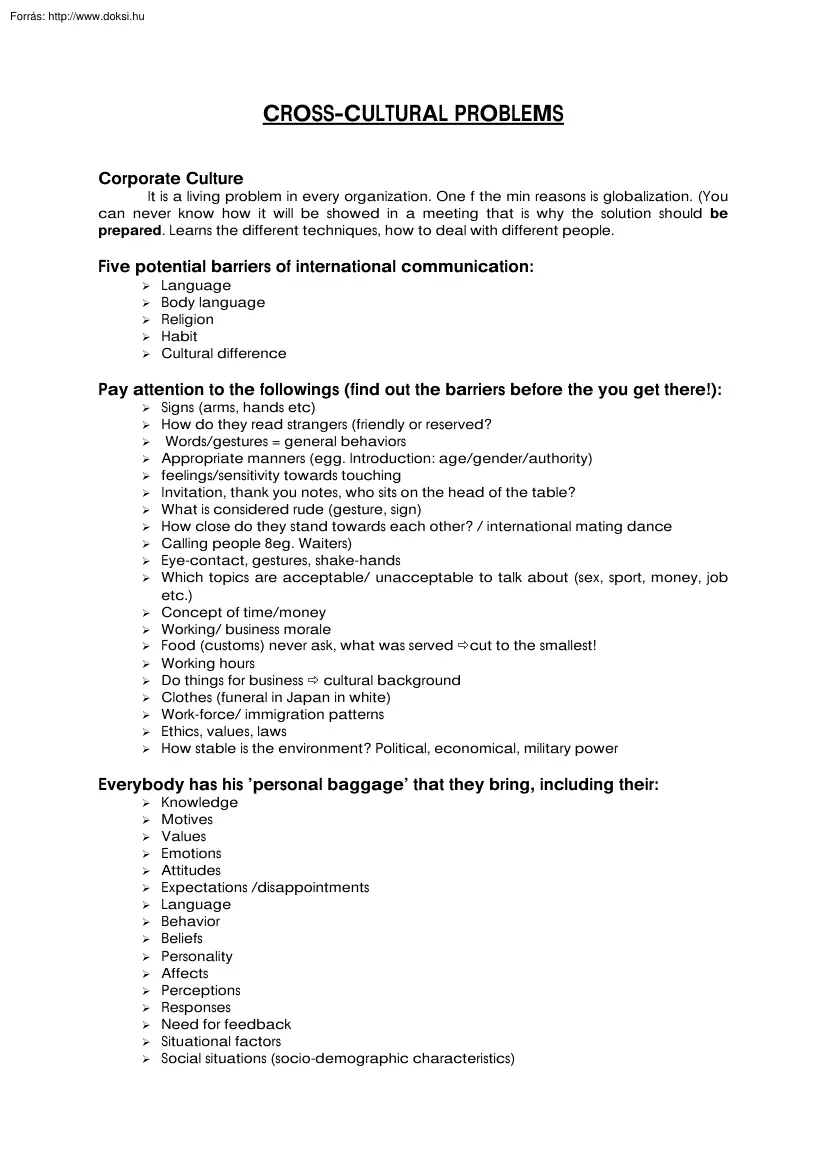A doksi online olvasásához kérlek jelentkezz be!

A doksi online olvasásához kérlek jelentkezz be!
Nincs még értékelés. Legyél Te az első!
Tartalmi kivonat
CROSS-CULTURAL PROBLEMS Corporate Culture It is a living problem in every organization. One f the min reasons is globalization (You can never know how it will be showed in a meeting that is why the solution should be prepared. Learns the different techniques, how to deal with different people Five potential barriers of international communication: Language Body language Religion Habit Cultural difference Pay attention to the followings (find out the barriers before the you get there!): Signs (arms, hands etc) How do they read strangers (friendly or reserved? Words/gestures = general behaviors Appropriate manners (egg. Introduction: age/gender/authority) feelings/sensitivity towards touching Invitation, thank you notes, who sits on the head of the table? What is considered rude (gesture, sign) How close do they stand towards each other? / international mating dance Calling people 8eg.
Waiters) Eye-contact, gestures, shake-hands Which topics are acceptable/ unacceptable to talk about (sex, sport, money, job etc.) Concept of time/money Working/ business morale Food (customs) never ask, what was served cut to the smallest! Working hours Do things for business cultural background Clothes (funeral in Japan in white) Work-force/ immigration patterns Ethics, values, laws How stable is the environment? Political, economical, military power Everybody has his ’personal baggage’ that they bring, including their: Knowledge Motives Values Emotions Attitudes Expectations /disappointments Language Behavior Beliefs Personality Affects Perceptions Responses Need for feedback Situational factors Social situations (socio-demographic characteristics) Non-verbal communication (gestures, posture, head, eye-, facial expression) Physical contact Kinetics (body motion) Porxemics
(role of space in behavior) Physical characteristics Environmental factors Paralanguage How to overcome these problems? It is not the person’s job to make communication successful Do not judge by clothes, gestures etc. Use gestures, if the other does not understand, look for similarities BE FLEXIBLE (change your attitude, which you brought through culture) Do not put two culture together, whom do not like each other (Taiwan-China) TRAINING Focus on the positive things BE PATIENT! Do not be body-body with your employees Show respect, emphasize, tolerate, look beyond superficial CROSS CULTURAL EFFECTS ON HUNGARY caused by international companies Staff are frightened because they have never worked with international people (lack of language knowledge) This leads to communication problems need for expensive interpreter Nobody have worked abroad Afraid of bigger expectations Different work moral They did
not try to understand the cultural background Introduced new corporate culture (does not tolerate ignorance and guest is always right!) Different accounting and financial systems Transfer possibilities, moving-up possibilities CROSS-CULTURAL ISSUES IN THE HOSPITALITY INDUSTRY Educational differences of management and staff Different mentalities Management has no experience how to handle the employees from a different culture Communication channels The staff cannot handle the cultural differences of the guests Different financial, taxation and controlling/accounting systems SOLUTION: CHANGE IN ATTITUDE TRAINING PATIENCE
Waiters) Eye-contact, gestures, shake-hands Which topics are acceptable/ unacceptable to talk about (sex, sport, money, job etc.) Concept of time/money Working/ business morale Food (customs) never ask, what was served cut to the smallest! Working hours Do things for business cultural background Clothes (funeral in Japan in white) Work-force/ immigration patterns Ethics, values, laws How stable is the environment? Political, economical, military power Everybody has his ’personal baggage’ that they bring, including their: Knowledge Motives Values Emotions Attitudes Expectations /disappointments Language Behavior Beliefs Personality Affects Perceptions Responses Need for feedback Situational factors Social situations (socio-demographic characteristics) Non-verbal communication (gestures, posture, head, eye-, facial expression) Physical contact Kinetics (body motion) Porxemics
(role of space in behavior) Physical characteristics Environmental factors Paralanguage How to overcome these problems? It is not the person’s job to make communication successful Do not judge by clothes, gestures etc. Use gestures, if the other does not understand, look for similarities BE FLEXIBLE (change your attitude, which you brought through culture) Do not put two culture together, whom do not like each other (Taiwan-China) TRAINING Focus on the positive things BE PATIENT! Do not be body-body with your employees Show respect, emphasize, tolerate, look beyond superficial CROSS CULTURAL EFFECTS ON HUNGARY caused by international companies Staff are frightened because they have never worked with international people (lack of language knowledge) This leads to communication problems need for expensive interpreter Nobody have worked abroad Afraid of bigger expectations Different work moral They did
not try to understand the cultural background Introduced new corporate culture (does not tolerate ignorance and guest is always right!) Different accounting and financial systems Transfer possibilities, moving-up possibilities CROSS-CULTURAL ISSUES IN THE HOSPITALITY INDUSTRY Educational differences of management and staff Different mentalities Management has no experience how to handle the employees from a different culture Communication channels The staff cannot handle the cultural differences of the guests Different financial, taxation and controlling/accounting systems SOLUTION: CHANGE IN ATTITUDE TRAINING PATIENCE




 Írásunkban a műelemzések készítésének módszertanát járjuk körül. Foglalkozunk az elemzés főbb fajtáival, szempontjaival és tanácsokat adunk az elemzés legfontosabb tartalmi elemeivel kapcsolatban is. Módszertani útmutatónk főként tanulók számára készült!
Írásunkban a műelemzések készítésének módszertanát járjuk körül. Foglalkozunk az elemzés főbb fajtáival, szempontjaival és tanácsokat adunk az elemzés legfontosabb tartalmi elemeivel kapcsolatban is. Módszertani útmutatónk főként tanulók számára készült!